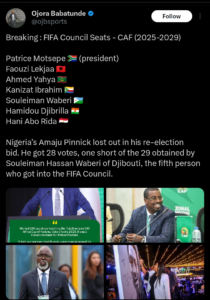In a closely contested election at the Confederation of African Football (CAF) General Assembly in Cairo on March 12, 2025, former Nigeria Football Federation (NFF) president Amaju Pinnick narrowly lost his seat on the FIFA Council by a single vote.
Amaju Pinnick secured 28 votes, just shy of the 29 votes obtained by Djibouti’s Souleiman Waberi, who claimed the fifth and final available seat.
The election saw Morocco’s Fouzi Lekjaa leading with 49 votes, followed by Egypt’s Hani Abou Rida and Niger’s Djibrilla Hima Hamidou, each with 35 votes. Mauritania’s Ahmed Yahya and Waberi both received 29 votes, securing their positions on the council.

Pinnick’s narrow miss marks the end of his tenure on FIFA’s highest decision-making body, where he had served since 2021.
The loss of Amaju Pinnick’s seat on the FIFA Council is a significant setback for Nigerian football. His position on the council gave Nigeria direct influence on key football decisions at the global level, ensuring that the country’s interests were represented in FIFA’s policy-making and developmental projects.
During his tenure, Pinnick played a role in securing FIFA funding for Nigerian football development and youth programs Without a Nigerian representative in FIFA’s highest decision-making body, the country risks reduced visibility in international football governance, potentially impacting funding, infrastructure development, and future bids to host major tournaments.
Without a Nigerian representative in FIFA’s highest decision-making body, the country risks reduced visibility in international football governance, potentially impacting funding, infrastructure development, and future bids to host major tournaments.
The loss also weakens Nigeria’s leverage in African football politics, as other nations may gain more influence in CAF and FIFA decision-making at Nigeria’s expense.
In the women’s category, Kanizat Ibrahim from the Comoros Islands secured the sole female representative seat on the FIFA Council with 30 votes, surpassing Lydia Nsekera, who received 13 votes.
The newly elected members will serve on the FIFA Council, responsible for setting the vision for global football development and making key decisions affecting the international game.















